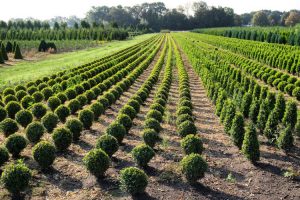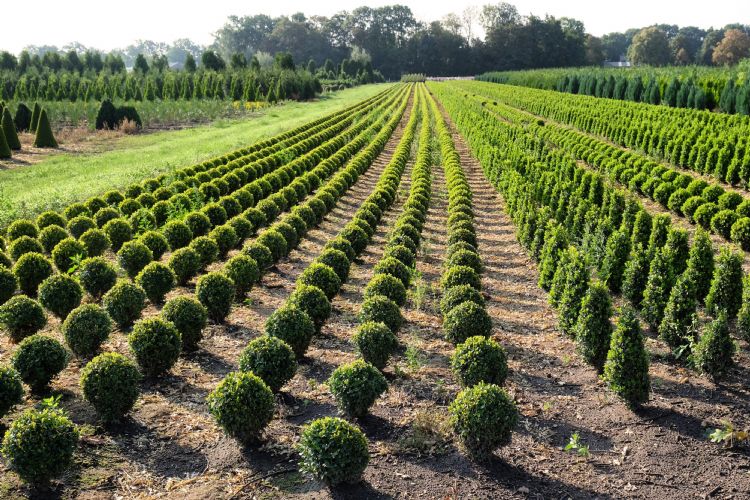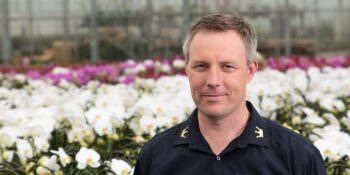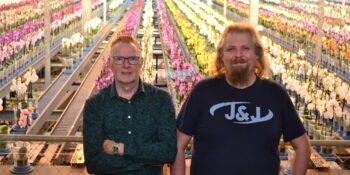MPS aims to offer its customers total insight, user-friendly tools and cooperation between parties
Daan de Vries has been director of MPS, a well-known foundation for sustainable production and procurement in the horticultural sector, since December 2020. He is continuing the course that MPS had already embarked upon: greater convenience and improved insight for users.
Author: Karlijn Raats

Daan de Vries, director of MPS
De Vries has always had a special fondness for trees and forests, right from an early age. That’s why after completing his degrees in mechanical engineering and business studies he went to Colombia to do volunteer work in the rainforests. Back in the Netherlands, De Vries quickly became involved in making international agricultural chains more sustainable, ending up as a board member at UTZ, the quality label for responsibly produced coffee, cocoa and tea that merged with the Rainforest Alliance in 2018.
Facilitating role
This journal asked De Vries about the role of an organisation such as MPS. ‘MPS makes companies’ performance on sustainability transparent. Transparency helps to speed up the process of introducing greater sustainability. It teaches people how they can become more sustainable in practice and creates recognition in the market,’ he explains.
As a result of natural competition, there are already quite a few sustainability labels on the international ornamentals market. Some tree nurseries find it hard to choose; others have doubts about the added value of a quality label, for instance if they view it chiefly as a marketing tool. MPS doesn’t actively seek to raise its profile among consumers, although growers can of course have the MPS vignette printed on tickets or labels. Yet for some time now MPS has enjoyed a solid reputation among all the stakeholders on the market.
Transparency can be a boost for growers
Guarantee of quality
Despite this marketing value, De Vries believes that the real value of the MPS quality label – and of quality labels in general – lies in the guarantee that a grower is actively involved in sustainability and that this is audited by an independent organisation. In other words: that each grower tells customers a unique story and that a quality label – such as MPS – provides clear proof that this story is genuine. ‘The number of quality labels is a separate issue. As far as I’m concerned, we need to aim for efficiency, but a single quality label is not feasible in an international market. Moreover, I’ve occasionally experienced that type of situation and heard people complain of a monopoly. A quality label acts as a kind of diploma that is renewed periodically; it’s about both the learning process and recognition. Some will see the former as more important, others the latter.’
The MPS-ABC certification scheme was overhauled this year in order to meet the criteria set by the Floriculture Sustainability Initiative (FSI), a broad sustainability platform in the ornamentals sector. The corresponding record-keeping environment has also been improved; it’s now even easier for growers to keep their record-keeping up-to-date in this user-friendly environment. A unique aspect of the MPS-ABC system is that growers have reference material: they can see the data averages for a group of growers that cultivate similar crops under similar conditions. This enables them to see where they still have room for improvement.
Cooperation and digitisation
Growers rate the benefits of a quality label more highly when it involves the minimum of hassle. ‘We try to make the record-keeping as efficient as possible because growers have enough to do already. Some of the rules relating to our certification derive from broader platforms, such as FSI. We need to keep working on this but our priority remains to make and keep things as simple as possible for the growers.’
Incidentally, De Vries also takes ease of use to include future opportunities for cooperation between parties in the chain. For example, the MPS-GAP programme has been benchmarked using GLOBALG.A.P. In the case of MPS-SQ and GRASP, efficiency is achieved via combined audits. ‘Nowadays everyone accepts that financial records need to be kept up-to-date, but there’s a limit to the number of quality labels and administrative tasks. No-one likes to see too much overlap. Growers need to be able to make an efficient choice. It would be a boost to facilitating sustainability if quality labels understood and recognised where differences in nuance have become too small.’
Ultimately society wants to become more sustainable; growers can play a role here
MPS aims to improve efficiency and ease of use further over the next few years and offer greater insight into business operations when it comes to sustainability. ‘A couple of aspects for future development are digitisation and data exchange,’ De Vries notes. ‘Some companies use a system from which they can input overall data on water and energy consumption into our system. The aim is to create connections between our system and others so that you obtain greater insight and can take better action as your records become ever more precise.
As MPS is helping many growers in the ornamentals sector to become more sustainable, it is also working to improve convenience for each crop type. ‘We can and will match up more specifically with growers of trees and perennials in the ornamentals sector outside the Netherlands,’ De Vries says. ‘MPS is currently conducting a customer survey. We’ll use the feedback from this as input for the next steps.’
Mandatory certification Royal FloraHolland
How did MPS react to Royal FloraHolland’s decision to make it mandatory to hold or obtain a sustainability certificate? ‘MPS views sustainability as a consequence of the intrinsic motivation of people or of demand from the market. In both cases MPS plays a facilitating role. Over the past few years, MPS has focused strongly on accommodating the ornamentals sector in response to the mandatory certification for growers demanded by Royal FloraHolland, for instance by cutting the cost. There are small nurseries as well and sometimes there’s so little demand from customers for a quality label that the cost is too high; we understand that. We’re monitoring the latest developments closely. Ultimately MPS wants to serve its customers to the best of its ability by providing insight and recognition and by doing so as efficiently as possible through digitisation and cooperation.’
Royal FloraHolland is currently reconsidering this mandatory certification following resistance from its members. A final decision will be taken later this year.
Position of retailers
Mandatory certification has applied to the food retail sector for quite some time. As retailers such as supermarkets now also sell flowers and plants, the food quality labels have already got a foot in the door of the ornamentals sector. ‘MPS wants to impress upon these parties that our quality label was developed in the ornamentals sector and is therefore better equipped to inspect flowers and plants,’ De Vries explains. The florist and garden centre market is more fragmented, but MPS aims to seek deeper cooperation within these chains as well. ‘Transparency and efficiency throughout the chain, that’s our goal. Cooperation, including between parties in the chain, can only accelerate this shift,’ De Vries concludes.
This article has been published in Dutch on the website of Boom-in-business.



